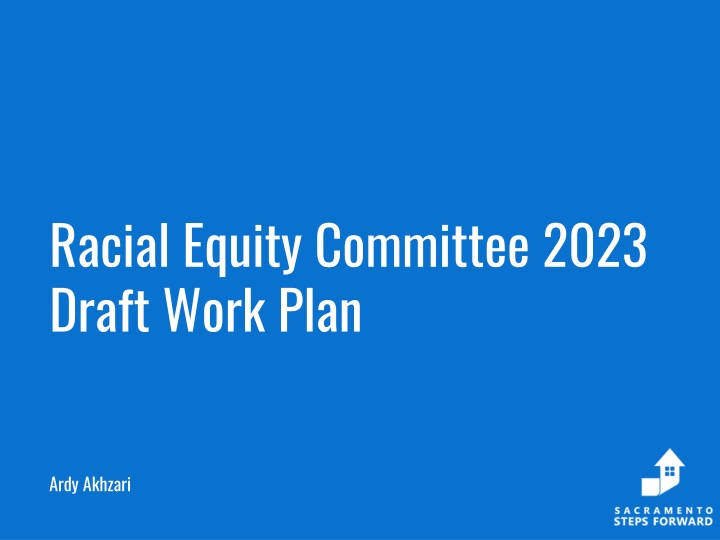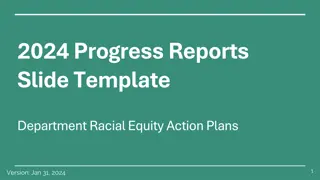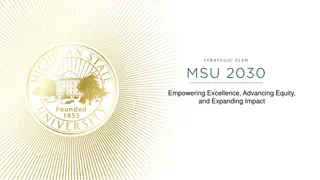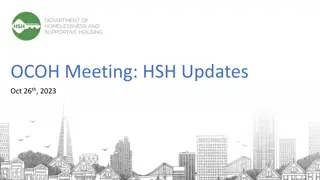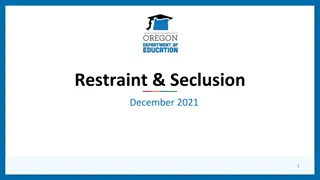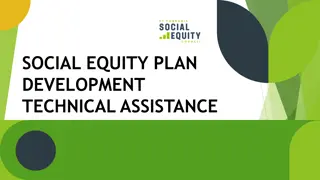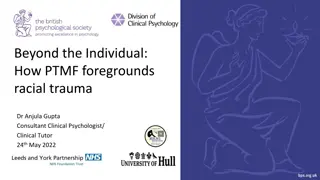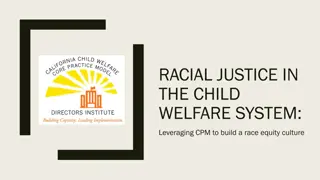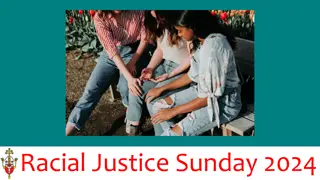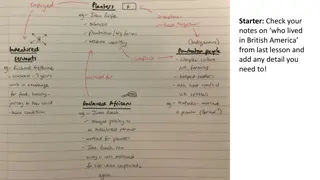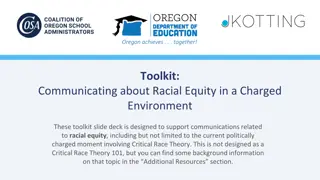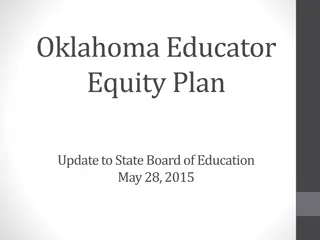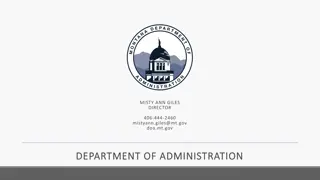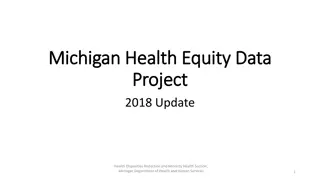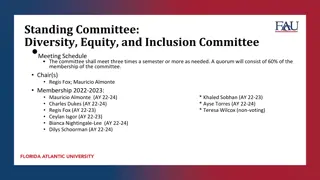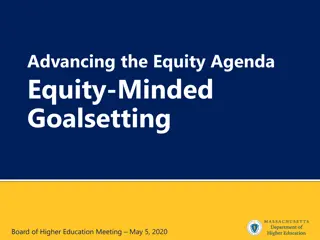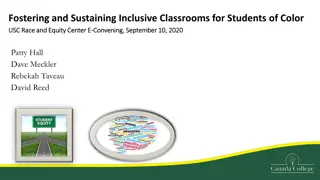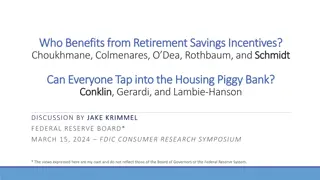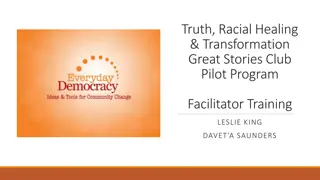Racial Equity Committee 2023 Draft Work Plan
This draft work plan outlines the goals and progress of the Racial Equity Committee for 2023. It includes incorporating racial equity goals into committee plans, exploring intersectionality data, providing input to HUD on ethnicity data, advocating for broader homelessness definitions, and identifying key performance measures. Training, education, and staff diversity initiatives are also detailed.
Uploaded on Mar 16, 2025 | 1 Views
Download Presentation

Please find below an Image/Link to download the presentation.
The content on the website is provided AS IS for your information and personal use only. It may not be sold, licensed, or shared on other websites without obtaining consent from the author.If you encounter any issues during the download, it is possible that the publisher has removed the file from their server.
You are allowed to download the files provided on this website for personal or commercial use, subject to the condition that they are used lawfully. All files are the property of their respective owners.
The content on the website is provided AS IS for your information and personal use only. It may not be sold, licensed, or shared on other websites without obtaining consent from the author.
E N D
Presentation Transcript
Racial Equity Committee 2023 Draft Work Plan Ardy Akhzari
Continuing With Our Recommendations Remaining Goals for 2023 Work Plan 21 of 37 original goals left to complete in 2023 Using the same methodology to prioritize based on tiered recommendations Tier 1 = 7, Tier 2 = 9, Tier 3 = 5 20 of the 21 have already been started 8 of them close to being finished (original target completion by end of 2022)
Data with an Equity Lens 1) Incorporate racial equity goals and tools into each of the CoC Board s committees when they develop their annual work plans. Have the REQC advise on the development and implementation of these goals and tools. (T2) Become acquainted with the work plans of the other committees Research and recommend appropriate tools In progress, 22 org completion Evidence: Racial Equity liaisons attend each subcommittee and offer insight and support. PRC Liaisons became voting members in July 2022 per the Governance Charter and approved by the Board. 2) Explore intersectionality data to understand multiplier effects of demographics outside of race and targeted universalism solutions (T1) SSF data team to undertake In progress, 22 org completion Evidence: Working with Trent Simmons to analyze Stella Data and refer to LHAP and Gaps Analysis
Data with an Equity Lens 3) Develop and provide input to HUD on mandated race and ethnicity data process. Explore opportunity to collaborate with other CoCs.(T1) SSF data team to work with REQC Meetings with other CoCs In progress Evidence: Need to establish FTE per CESH funds to determine who will be leading this effort. 4) If HUD presents an opportunity for community input on the definition of homelessness, advocate for a broader definition.(T1) SSF data team to work with REQC In progress Evidence: Special NOFO, defining Severe Service Need: PLE Cohort 5) Work with the REQC to Identify racial equity key performance measures (T1) SSF data team to work with REQC Evidence: REQC is forming a working group to establish this and will meet in late October
Training and Education 6) Provide ongoing training and educational opportunities that are free and open to the entire community. The trainings should be determined by the needs that are demonstrated and expressed to better understand and promote racial equity. Note: Free disability training is available through the local independent living center (RIL).(T1) Training needs assessment Implementation Research and recommend appropriate tools In progress, 22 org completion Evidence: See CoC REQC Training Plan
Staff and Leadership Diversity 7) Among Sacramento s homelessness service providers, encourage social equity -- intentionally hiring management level individuals with lived experience. (T2) Interview providers to understand interest and challenges In progress, 22 org completion Evidence: REQC liaisons, Racial Equity Specialist, PLE Coordinator provided support and guidance for the new Rank and Review Tool. SSF Equity Team has been collaborating with 211, and CE Team to establish Community Conversations with providers.
Assessment and Prioritization 8) Explore alternative tools and methodologies for potential future use.(T2) CE Committee to coordinate with REQC In progress, 22 org completion Evidence: Developed Pilot tool within the PLE Cohort, ready to Pilot by October 2022 9) Educate those who conduct needs assessments about racial disparities in housing and homelessness. Advocate for racial equity training for anyone who administers an assessment.(T2) Engage all of the teams that conduct assessments, Assess and build from their knowledge baseline, Develop campaign with supporting resources In progress, 22 org completion Evidence: 2022 CoC Racial Equity Training Plan, HPS, Trauma Informed Interviewing (PLE Cohort)
Language Access 10) Translate all necessary information and documentation into multiple languages)(T2) Determine which languages to hire translation firms Check readability and cultural appropriateness In progress Evidence: Sacramento Language Needs working group was established in June 2022. (Members: Julie McFarland(consultant), Gabriel Kendall (211), Deisy Madrigal (LSS), Reijie Baloyos (Asian Resources), Kazoua Heu (Lao Family), Carmen Briscoe (Sac County) Meeting twice a month 11) Train service providers on navigating access to translated forms and delivering assessments(T2) Engage all of the teams that conduct assessments Assess and build from their knowledge baseline Not started Evidence: Seeking more CE input from SSF CE Team 12) Ensure that all newly implemented tools and documents are offered in multiple languages (T2) Determine which languages to hire translation firms Check readability and cultural appropriateness In progress Evidence: Sacramento Language Needs working group will present this to the CESC in October
Funding & Readability Funding 13) Funding for free and ongoing access to real-time translation and interpreting services for providers and programs without bilingual and multilingual staff.(T3) Develop a sustainable fund development strategy that may include a mix of public and private dollars In progress Evidence: Peter Bell is trying to secure funds Readability 14) Assess all documents that are provided to clients for readability; as necessary, re-create them to read at a 4th-5th grade level. (T2) May need to work with legal counsel to revise documents In progress Evidence: Sacramento Language Needs working group was established in June 2022. (Members: Julie McFarland(consultant), Gabriel Kendall (211), Deisy Madrigal (LSS), Reijie Baloyos (Asian Resources), Kazoua Heu (Lao Family), Carmen Briscoe (Sac County) Meeting twice a month
Accommodations 15) Include accessibility statements on all outreach materials/brochures that includes who to reach out to if someone needs accommodations to participate in programs and services.(T1) In progress, 22 org completion Evidence: Sacramento Language Needs working group was established in June 2022. (Members: Julie McFarland(consultant), Gabriel Kendall (211), Deisy Madrigal (LSS), Reijie Baloyos (Asian Resources), Kazoua Heu (Lao Family), Carmen Briscoe (Sac County) Meeting twice a month
Equitable Funding 16) Explore developing the capacity of small, BIPOC-led organizations by offering cohort and individual training and technical assistance annually, in preparation for competitive procurement and successful implementation of the NOFA and other opportunities to diversify Sacramento s network of homelessness providers. Explore paying existing BIPOC-led providers to provide the training and technical assistance as peer mentors.(T3) Training need assessment In progress Evidence: CORE HUD Equity Team Goal # 2: Increase access points, referrals and placements into housing for the BIPOC community that are not segregated into one area. 17) Incentivize larger organizations to partner with small, BIPOC-led organizations that have a longstanding history of working in the community by providing preference to their funding applications when such partnerships are in place or by requiring complementary collaboration.(T3) Review and update of current RFP policies with the PRC In progress Evidence: PRC and Racial Equity Liaisons 18) Evaluate current funded projects for effectiveness with BIPOC populations (T3) SPC, data team and potentially consultants to work together on evaluation In progress Evidence: Evaluation of HHAP, NOFO, SNOFO (New Tools developed by Liaisons and SSF Equity team)
HMIS 19) Convene leaders and database administrators to discuss opportunities to standardize data collection and reporting, reduce duplicative data entry across systems, and explore potential for future data sharing (Source: Gaps Analysis).(T3) Identify leaders and database administrators Evidence: Working with HMIS/Data team at SSF to explore Stella, HMIS, and GAPS Analysis for demographic data. --REQ Specialist analyzes the Family Housing Assessment monthly. 20) Consider funding a diverse team of resource specialists to provide intensive hands-on coaching with current and potential HMIS users to increase their comfort and success with inputting and accessing HMIS data. (T2) SSF data team to undertake Evidence: NEEDS Assistance 21) Individuals who are serving as volunteers or staff for BIPOC-led and BIPOC-serving organizations should specifically be outreached to receive this HMIS support. (T1) Conduct outreach to offer hands-on coaching Evidence: Have some connections to BIPOC Led Staff, but need additional SSF Support.
